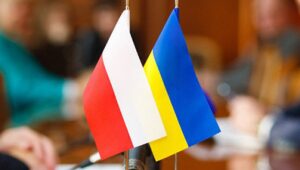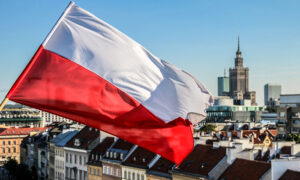
NPC Ukrenergo, together with Poland, is working to increase the technical capabilities and volumes of electricity supplies to Ukraine in autumn and winter, said Volodymyr Kudrytskyi, Chairman of the Board of the NPC.
“We continue to work not only on repairs and development of protection, but also on finding solutions to attract more electricity to Ukraine from Europe. In particular, we are actively working with the Polish side to increase the technical capabilities and volume of electricity supplies to Ukraine in the fall and winter. We are working on options to compensate for the deficit caused by Russian attacks,” he wrote on his Facebook page on Friday evening.
Kudrytsky noted that he would provide more details when agreements are reached.
He also emphasized that Ukrenergo has not imposed any restrictions on electricity consumption for almost a week now, as there is enough electricity in the system to meet all needs.
Also, according to him, the dispatch center does not plan to cut power this weekend. “This is an important relief for all Ukrainians, but I have to remind you that we have no right to relax: the damage to the power system is significant, and we still face challenges. The heat above 30 degrees may still return, and then the situation in the power system may change. Please follow our messages and those of your regional power distribution companies,” emphasized the CEO.

On the eve of the NATO summit in Washington, President of Ukraine Volodymyr Zelenskyy and Polish Prime Minister Donald Tusk signed a bilateral security agreement in Warsaw. “Those who are defending Ukraine today are also defending themselves,” Tusk said.
The President of Ukraine called the agreement “ambitious”. “It is able to protect the lives of our people and resist Russian evil,” Selenskyy said. The agreement provides for the development of a mechanism by which “Russian missiles and drones fired in the direction of Poland can be shot down in Ukrainian airspace.”
Zelenskyy arrived in Poland on the day of fierce Russian missile attacks on his country that killed at least 26 people. A major children’s hospital in Kyiv was damaged. “There are no words, no documents, no political statements that would be enough to condemn the aggressor,” Tusk said.
Poland, a member of the EU and NATO, is one of the staunchest political and military supporters of Ukraine under attack by Russia. It also serves as an important hub for Western military aid to Kyiv. Poland has also hosted nearly a million refugees from its neighboring country.
Ukraine has concluded security agreements with the EU and 19 individual states, including the United States, Japan, and Germany. They formalize the military and civilian support already provided and offer the prospect of further assistance for an initial period of ten years.
In the afternoon, Selensky will meet with his Polish counterpart, Andrzej Duda. The NATO summit on the occasion of the 75th anniversary of the defense alliance will be held in Washington from July 9 to 11. The heads of state and government of the alliance’s 32 member states are expected to discuss, among other things, further assistance to Ukraine. Zelenskyy is also invited to the meeting. With the airspace over Ukraine closed since the start of the war, Zelenskiy must use the land route through Poland for all foreign travel before he can continue his journey by plane from there.
Source: https://www.zeit.de/news/2024-07/08/polen-und-ukraine-unterzeichnen-sicherheitsabkommen

The border with Poland has resumed the passage of freight transport, the State Customs Service of Ukraine reports.
“In connection with the settlement by the Polish side of the issue of crossing the border by trucks with Ukrainian registration, the passage of trucks through checkpoints on the border with the Republic of Poland located in the area of Lviv Customs has been resumed,” the company said in a statement on its telegram channel.
As reported, truck traffic was suspended from 00:00 on July 1.

Poland has suspended entry and exit permits for Ukrainian trucks that do not have international freight transportation permits.
This was reported by the State Customs Service of Ukraine on Telegram on Monday.

Poland is becoming an increasingly popular destination for real estate investment among foreigners. This is due to economic stability, a growing real estate market and attractive prices. In this article, we will look at the peculiarities of buying and selling real estate in three key Polish cities: Wroclaw, Krakow and Warsaw.
Wroclaw: The city of a thousand bridges
Buying real estate in Wroclaw
Wroclaw, with its rich history and cultural heritage, is one of the most attractive cities for investment. Buying real estate in Wroclaw offers a variety from historic buildings in the city center to modern apartments in new residential complexes.
– Prices: The average price per square meter in Wroclaw ranges from 7000 to 11000 PLN, depending on the neighborhood and the condition of the property.
– Buying process: The process begins with selecting a suitable property, checking its legal purity and finalizing the transaction through a notary.
Additional costs such as purchase tax (2%) and notary fees should also be taken into account.
Real estate for sale in Wroclaw
Selling real estate in Wrocław can be profitable, especially if the property is located in a prestigious area or has unique characteristics.
Preparation for sale: It is important to properly prepare the property for sale by making the necessary repairs and putting it in an attractive condition.
Marketing: Effective marketing, including professional photos and advertising on popular platforms, can significantly speed up the sale process.
Krakow: The cultural capital of Poland
Buying real estate in Krakow
Krakow is known for its old town and universities, which makes it attractive for students and tourists. Buying real estate in Krakow can be a great investment for both living and renting.
– Prices: The average price per square meter in Krakow is between 8000 and 12000 PLN.
– Buying process: Buying real estate in Krakow requires a thorough check of the documents and the legal purity of the property. Notary fees and purchase tax should also be taken into account.
Selling real estate in Krakow
Selling real estate in Krakow can be particularly lucrative due to the constant demand from students and tourists.
– Preparing for the sale: Before putting a property up for sale, it is important to assess the market value and, if necessary, improve the condition of the property.
– Marketing: Placing ads on popular websites, using social media and professional photography will help attract more potential buyers.
Warsaw: The capital and economic center of Poland
Buying real estate in Warsaw
Warsaw, as the capital of Poland, attracts investors from all over the world. Many international companies have their headquarters here, which makes the real estate market very active.
– Prices: The average price per square meter in Warsaw varies from 9000 to 15000 PLN.
– Buying process: Buying real estate in Warsaw requires attention to detail and legal aspects. It is recommended to use the services of professional realtors and lawyers.
Selling real estate in Warsaw
Selling real estate in Warsaw can be very profitable, especially in central areas and areas with good infrastructure.
Preparation for sale: High-quality preparation of the property, including renovation and decoration, will help to increase its attractiveness.
– Marketing: The use of various marketing channels, including online platforms and social media, will help to reach a wide audience.
Conclusion.
Buying and selling real estate in Wroclaw, Krakow, and Warsaw has its own peculiarities, but in all cases it is important to take into account legal aspects, market trends, and effective marketing strategies. Whether you are looking for a home for yourself or an investment, Poland offers many opportunities for successful real estate transactions.

Grain transit through Poland has significantly decreased from January to May due to the loss of current markets in Europe and beyond, as well as a change in the vector of Ukrainian grain sales, which is 90% through the Black Sea Canal and Romania, Polish Deputy Prime Minister Wladyslaw Kosyniak-Kamysh said at a meeting with representatives of the People’s National Farmers’ Protest on Friday.
“From January to May, the transit (of grain through Poland) was halved,” Polish Agriculture Minister Czeslaw Sekerski informed the meeting participants, according to the official website of the Polish Ministry of Agriculture.
According to the Vice Prime Minister, one of the reasons for the problems in the grain market is the loss of Poland’s current markets in Europe and beyond.
“More than 90% of grain transit from Ukraine is carried out through the Black Sea Canal and Romania,” Kosyniak-Kamysh said.
He also expressed his support for the expansion of agro-ports and grain terminals, while announcing the government’s decision to unblock the waterway to the port of Elbląg.
According to Kosyniak-Kamysh, the European Union’s decision on Ukraine’s access to the community market is the last possible solution in the current formula.
“The EU’s dialog with Ukraine should last for many years. Just like our accession negotiations,” he said.
At the same time, the Deputy Prime Minister called for a significant tightening of border controls to prevent the importation of products that do not meet high European standards into Poland.
Source: https://www.gov.pl/web/rolnictwo/trzeba-wrocic-do-ochrony-rynku-europejskiego